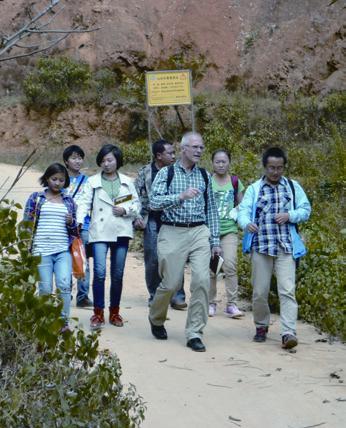Living for a Cause
By Wei Hongchen
At the age of 18, Michael Hermann from Dortmund, then part of the Federal Republic of Germany, decided to become an international volunteer. Since 2005, he has worked in China on poverty alleviation and disease control in Yunnan and Sichuan provinces, as well as Chongqing Municipality in southwest China, as the representative of the Federation for Associations Connected to the International Humana People-to-People Movement (FAIHPP) in China. He has no plan to ever leave.
Through the years, Hermann has popularized planting technologies among Chinese farmers, spread knowledge on preventing HIV/AIDS and raised funds to help impoverished children in rural areas access preschool education. He has learned Mandarin and can speak it fl uently now.

Chinese people nicknamed him “the foolish charity man,” alluding to the ancient Chinese fable in which an old man was determined to move the mountains blocking his way. In Hermanns case, the “mountain”he is trying to remove is poverty.
FAIHPP is a nonprofit international organization headquartered in Switzerland and devoted to education, healthcare and rural development in Europe, Asia, Africa and the Americas. To date, the organization has carried out 17 programs in Yunnan, Sichuan and Chongqing, in such areas as rural development and poverty alleviation, preschool education for impoverished families, infectious disease control and lowcarbon life.
Unusual career path
Hermann was born in 1957 into a middle class German family. His father was a doctor and his mother a teacher. Hermann was considered rebellious by many people as a young student. He joined student protests against the U.S. military occupation of Viet Nam. He was interested in historical events such as Africas national liberation movements and the Chinese Long March. After graduating from high school, Hermann skipped university and refused to join the West German military—which was mandatory—because he didnt want to join an army that had started two world wars.
He went to the local court and finally persuaded the judges to allow him to volunteer at a local hospice instead of serving in the military. That was the first time Hermann did volunteer work and the 18 months he spent at the hospice changed the course of his life. He decided to become an international volunteer soon after.
“I love freedom, fairness and philanthropy. My father wanted me to become a doctor like him but I want to do something to contribute to peace, to volunteer around the world and help people in the poorest villages get rid of poverty,” Hermann told Beijing Review. After he left Germany, Hermann has been to 44 countries and worked in 35 of them, while his involvement with China started in the 1980s.
“China has always inspired me,” he said. “Especially the slogan above the Tiananmen Gate Tower in Beijing: ‘Long live the great unity of the people of the world,which illustrates the Chinese peoples spirit of internationalism.”
Hermann studied Chinese at Fudan University in Shanghai from 1987 to 1989. He was very curious about everything in China. Every weekend, he rode his bicycle around Shanghai and also cycled to many other cities in China including Wuhan in Hubei Province, central China, which is over 800 km from Shanghai.
In 2005, the Yunnan provincial poverty alleviation offi ce decided to cooperate with FAIHPP and Hermann moved to Yunnan.
Fighting poverty
While Hermann and his team were conducting poverty alleviation in Zhenkang, a county in Yunnan, in 2008, they found that there were no preschool institutions in the villages, which were small and had limited educational resources. At least one adult per family had to stay home to look after the children and therefore couldnt work, which greatly reduced household income. These families were stuck in a vicious circle of poverty.
That same year, Hermann decided to break the cycle by launching the “future hope kindergarten program” in a village in Zhenkang. The kindergarten enabled both parents to work to increase income and shed poverty.
Under the program, local villagers were mobilized to renovate an idle school into a kindergarten, while villagers with a diploma above middle school were selected to teach the children.
The teachers have received three-year training delivered by the program manager and preschool education experts. Each class has 15 to 30 children between 3 and 6 years old, taught by a fulltime teacher and a volunteer assistant teacher. As of the end of 2019, the program had provided preschool education to over 27,000 impoverished children.
Hermann told Beijing Review he believes the program is of great signifi cance for the education of children since the fi rst seven years of a childs life determines a persons self-confidence, imagination and personalities.

Poverty alleviation must begin with intellectual support. Preschool education is an important way to prevent poverty from being passed on from one generation to another and has always been a government focus. In 2011, the Yunnan Provincial Government implemented its first pre-education three-year action plan, and with the increase of fi nancial support, the provinces pre-education enrollment rate increased from 37.43 percent in 2010 to 84.27 percent in 2019. In addition, to realize full kindergarten coverage, Yunnan has rolled out the “one village, one kindergarten” policy to ensure each village has a kindergarten.
Hermann said that as the government pays more attention to preschool education, his focus has shifted to providing support for the “one village, one kindergarten” policy, which includes providing funding for teacher training, incentives and subsidies. “Our goal is to leave no single child behind on their way to pursuing their dreams,” Hermann said.
In this year, China is going to achieve its goal to eradicate absolute poverty, and to complete the building of a moderately prosperous society in all respects.“China will accomplish the United Nations Sustainable Development Goals 10 years earlier,” Hermann said.
What has also impressed Hermann is the increased average life expectancy of Chinese people. In 1949, the year the Peoples Republic of China was founded, life expectancy was under 35 years. By 2018, the fi gure had risen to 77 years.
“No other country in the world has been capable of increasing peoples average life expectancy by such a large margin within such a short period of time. This is a remarkable feat,” he said.
When asked how long he wants to stay in China, Hermann replied, “For the rest of my life, hopefully until 2049, because China will be a modern socialist country that is prosperous, strong, democratic, culturally advanced, harmonious and beautiful by then.”

